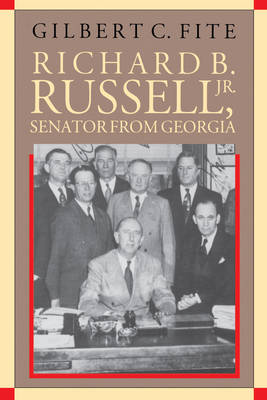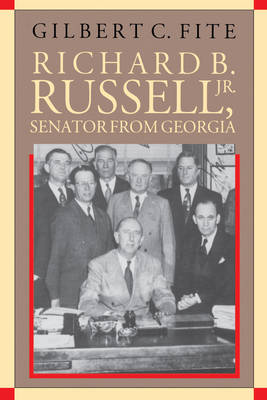
- Retrait gratuit dans votre magasin Club
- 7.000.000 titres dans notre catalogue
- Payer en toute sécurité
- Toujours un magasin près de chez vous
- Retrait gratuit dans votre magasin Club
- 7.000.0000 titres dans notre catalogue
- Payer en toute sécurité
- Toujours un magasin près de chez vous
Description
Richard B. Russell, Jr., represented Georgia in the United States Senate from 1933 to 1971, a period of sweeping social change. Russell (1879-1971) was regarded by his fellow senators as the quintessential member of the Senate's establishment, and they dubbed him "a Senator's Senator" and "the Georgia Giant." So great was his popularity in Congress that Lyndon B. Johnson once said, "If the membership of the Senate were to cast a secret vote on the man they believed best qualifies to be president of the United States, they would choose Richard Russell."
Gilbert Fite's masterful biography begins with Russell's upbringing in an elite Georgia family. The highly stratified and class-conscious society of his early years would later influence Russell's legislative agenda. In 1920, Russell was elected to the Georgia General Assembly, and in 1931 he became governor of Georgia. He held that office until 1933, when he began his thirty-eight years of service in the U.S. Senate.
During Russell's long senatorial career, he was deeply involved in many of the most important episodes of our national life: the New Deal, World War II, the MacArthur investigation, the foreign aid debate, and the Warren Commission inquiry. His greatest contribution, according to Fite, was his fierce determination to maintain a strong national defense during the Cold War; in his sixteen years as chairman of the Armed Services Committee, he emerged as the acknowledged leader in Congress on defense matters. A career-long member of the Senate Appropriations Committee, Russell also became one of the nation's strongest advocates of farm price supports. Under his sponsorship, the Senate enacted legislation establishing the school lunch program and distribution of food to the needy.
But Russell never abandoned his dedication to the South's traditional values, and he became the leader of the Southern Bloc that staunchly fought to defeat civil rights legislation and maintain the structures of segregation. Russell's unwillingness to compromise on civil rights, says Fite, meant that his career was ultimately one of regional rather than national leadership.
Gilbert Fite's masterful biography begins with Russell's upbringing in an elite Georgia family. The highly stratified and class-conscious society of his early years would later influence Russell's legislative agenda. In 1920, Russell was elected to the Georgia General Assembly, and in 1931 he became governor of Georgia. He held that office until 1933, when he began his thirty-eight years of service in the U.S. Senate.
During Russell's long senatorial career, he was deeply involved in many of the most important episodes of our national life: the New Deal, World War II, the MacArthur investigation, the foreign aid debate, and the Warren Commission inquiry. His greatest contribution, according to Fite, was his fierce determination to maintain a strong national defense during the Cold War; in his sixteen years as chairman of the Armed Services Committee, he emerged as the acknowledged leader in Congress on defense matters. A career-long member of the Senate Appropriations Committee, Russell also became one of the nation's strongest advocates of farm price supports. Under his sponsorship, the Senate enacted legislation establishing the school lunch program and distribution of food to the needy.
But Russell never abandoned his dedication to the South's traditional values, and he became the leader of the Southern Bloc that staunchly fought to defeat civil rights legislation and maintain the structures of segregation. Russell's unwillingness to compromise on civil rights, says Fite, meant that his career was ultimately one of regional rather than national leadership.
Spécifications
Parties prenantes
- Auteur(s) :
- Editeur:
Contenu
- Nombre de pages :
- 582
- Langue:
- Anglais
- Collection :
Caractéristiques
- EAN:
- 9780807854655
- Date de parution :
- 01-09-02
- Format:
- Livre broché
- Format numérique:
- Trade paperback (VS)
- Dimensions :
- 160 mm x 239 mm
- Poids :
- 839 g

Les avis
Nous publions uniquement les avis qui respectent les conditions requises. Consultez nos conditions pour les avis.






